Why have Americans become so mean? I was recently talking with a restaurant owner who said that he has to eject a customer from his restaurant for rude or cruel behavior once a week—something that never used to happen. A head nurse at a hospital told me that many on her staff are leaving the profession because patients have become so abusive.
At the far extreme of meanness, hate crimes rose in 2020 to their highest level in 12 years. Murder rates have been surging, at least until recently. Same with gun sales. Social trust is plummeting. In 2000, two-thirds of American households gave to charity; in 2018, fewer than half did. The words that define our age reek of menace: conspiracy, polarization, mass shootings, trauma, safe spaces.
The article is paywalled, so I can't read the rest of it. But you folks all know me pretty well, so you can probably guess what's next: Is it, in fact, true that we've become meaner over the last decade or so?
This is not an easy question to answer. We're interested in "mean" interpersonal interactions, not necessarily riots or murder rates. But who measures that? Who even decides what it is?
I thought about this for a short while and came up with some examples. Like Brooks, let's start at the extreme end:
 Violent victimization has been dropping fairly steadily over the past 10+ years. In 2021 it was a third lower than in 2008.
Violent victimization has been dropping fairly steadily over the past 10+ years. In 2021 it was a third lower than in 2008.
Stepping down the scale a bit, here is red light running, which is the best proxy for aggressive driving I could find in the AAA's annual Traffic Safety Culture Index:
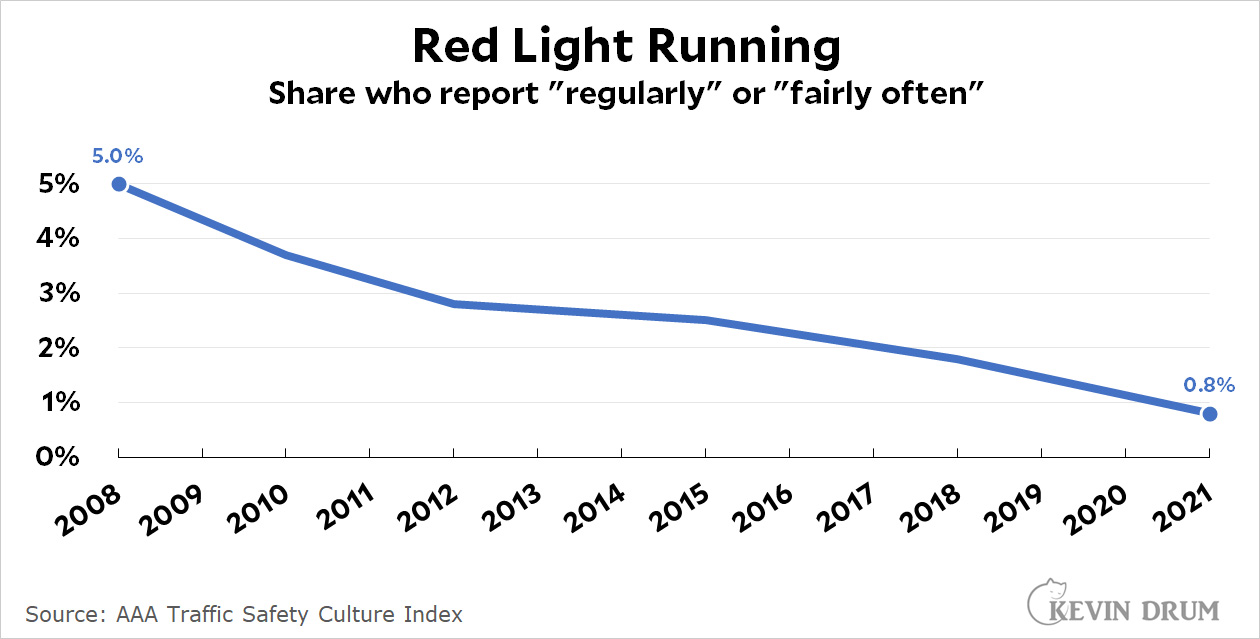 Like every other measure of aggressive driving in the AAA report, it's down substantially since 2008.
Like every other measure of aggressive driving in the AAA report, it's down substantially since 2008.
Here are incidents of unruly airline behavior reported to the FAA:
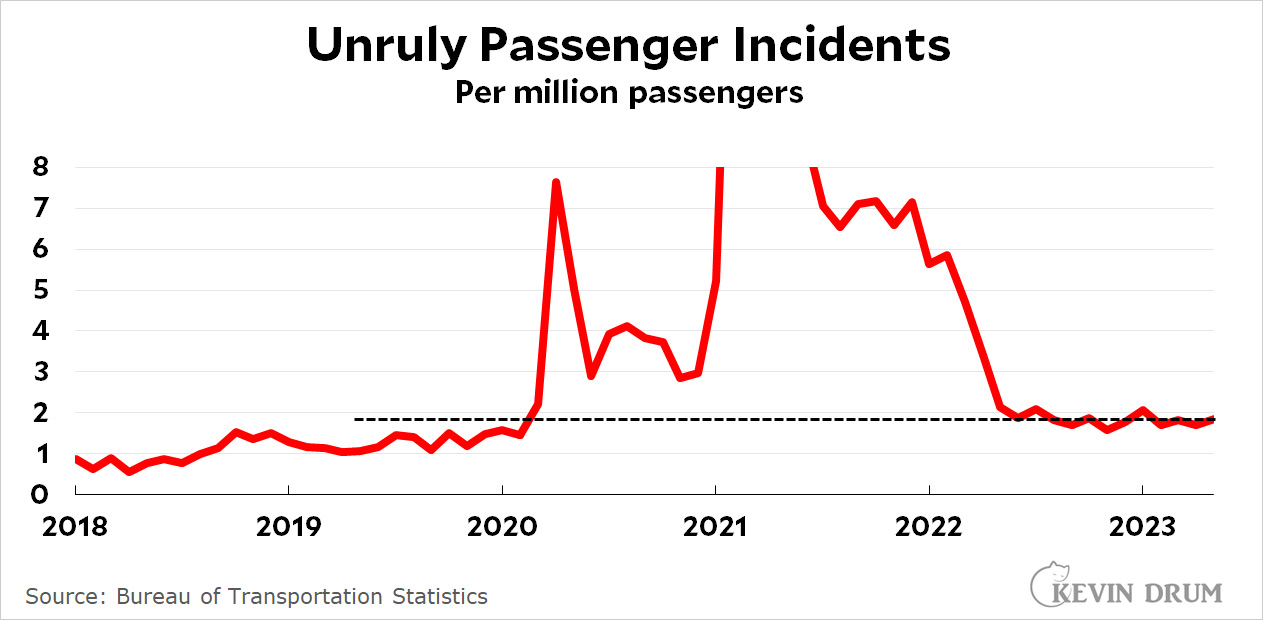 This has been going up—but not by a whole lot. The latest figures are only slightly higher than just before the pandemic, and are heading down.
This has been going up—but not by a whole lot. The latest figures are only slightly higher than just before the pandemic, and are heading down.
And here, believe it or not, are a couple of results from the annual Customer Rage Survey, conducted by Customer Care Measurement & Consulting and Arizona State University:
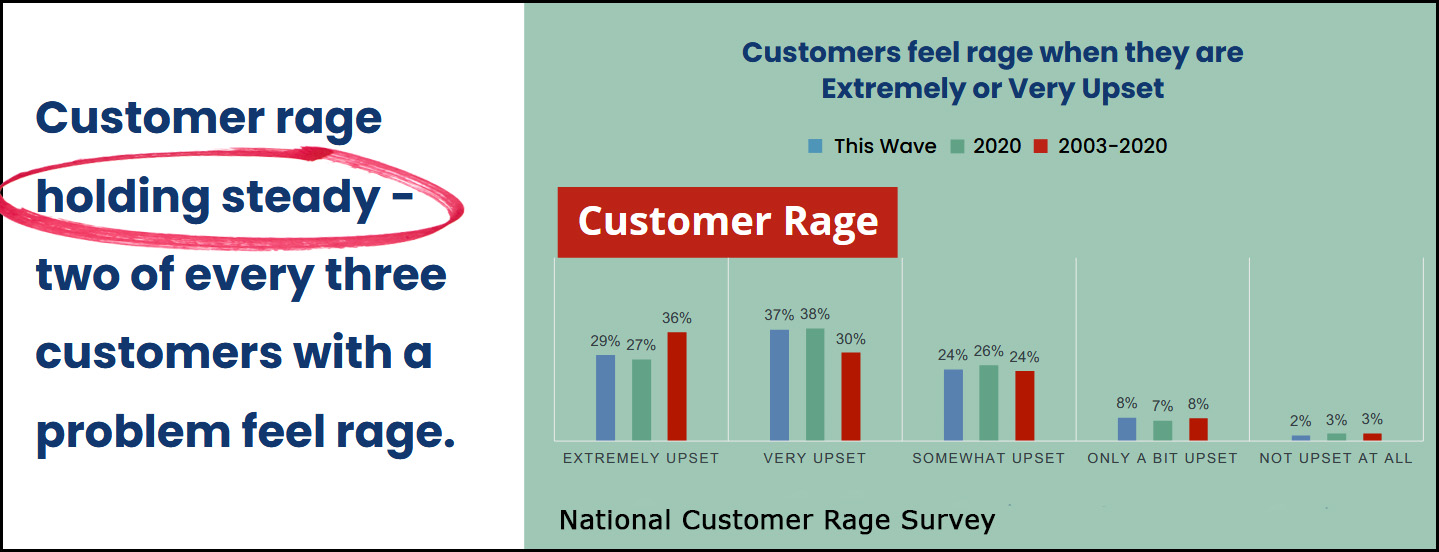 The number of people reporting that they get "extremely" or "very" upset at things was 66% in 2003 and 66% in 2022. There's also this:
The number of people reporting that they get "extremely" or "very" upset at things was 66% in 2003 and 66% in 2022. There's also this:
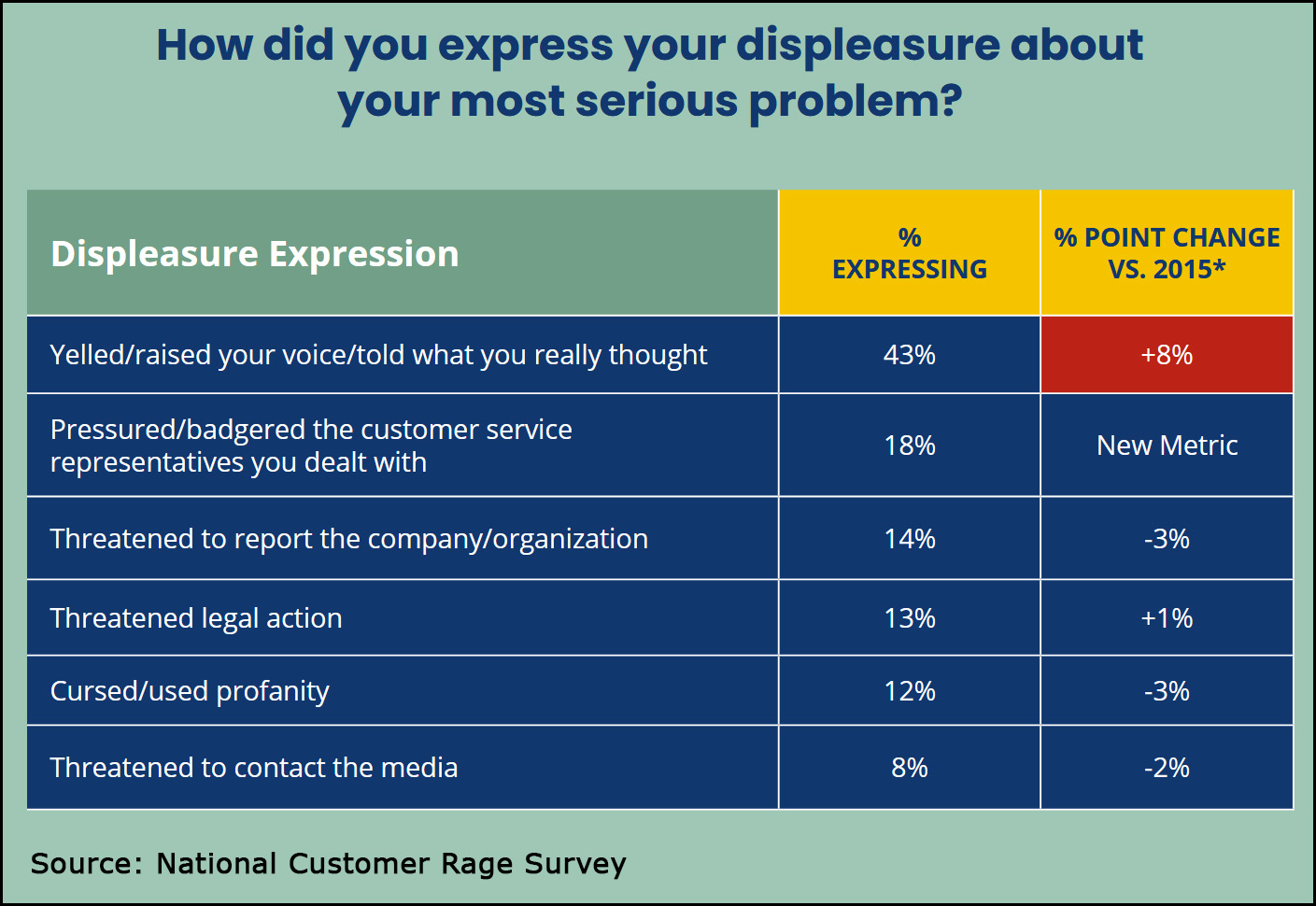 Compared to 2015, more people raised their voice when they were mad, but on every other metric bad behavior was down.
Compared to 2015, more people raised their voice when they were mad, but on every other metric bad behavior was down.
Here is school bullying:
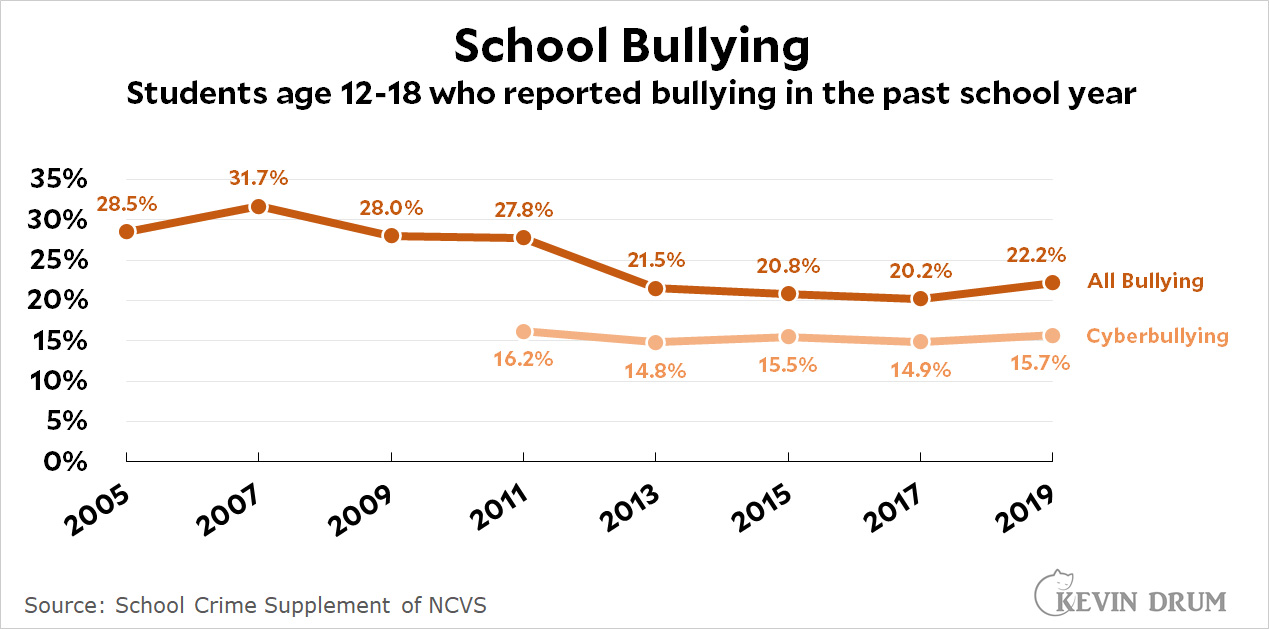 None of this stuff is proof positive of anything. For one thing, almost all of it is self-reported, and maybe people are just kidding themselves. There's also no measure here of political polarization and anger, which has certainly increased over the past couple of decades. Still, almost all of these metrics point in the same direction: we're getting nicer, not meaner. The only exception is airline incidents, which have increased a little bit and are probably still suffering a hangover from the COVID era, when air passengers went completely bonkers.
None of this stuff is proof positive of anything. For one thing, almost all of it is self-reported, and maybe people are just kidding themselves. There's also no measure here of political polarization and anger, which has certainly increased over the past couple of decades. Still, almost all of these metrics point in the same direction: we're getting nicer, not meaner. The only exception is airline incidents, which have increased a little bit and are probably still suffering a hangover from the COVID era, when air passengers went completely bonkers.
If you can think of other examples, leave them in comments. Just remember, we're interested here in low-level rudeness and aggression, not wars or international terrorism.

If I marinated in right-wing media the way I presume David Brooks does, I'd probably think that everyone was mean too.
Well, he's become an apostate against The Defendant in recent years, so perhaps this is the first time that he, personally, is feeling the hate coming off the movement that he worked so long and hard to further.
Locally, we had a big surge in red light running last year, which is still tailing off.
After Trump left office, local Facebook pages -- the public ones anyway -- cleaned up quite a bit. Pretty much all the yellers and haters scurried off into local private groups, echo chambers really. It took some time. However, a lot of pleasant people did about then too, and have noticeably not returned.
Both these are anecdotal, but I sure feel more comfortable out and about than I did a few years ago. Small town, West Coast.
Red light running in Tucson is worse now than 10 years ago, especially after voters removed the red-light cameras.
Sorry, even though David is a fellow Canadian, I no longer read his missives nor do I value his judgement.
Two days in a row, mid day no heavy traffic in the little town where I live, stopped waiting for my green light. Alas, a car went through a red light, right into my passenger door had I not hesitated. Next day, same thing. Different street. I hesitated at the green light again and lo, the dude with the red light just drove on through.
Maybe not mean but certainly not kind or friendly.
In Canada, getting into a car crash is correlated, across all demographic groups, with not getting a COVID vaccine. Could it be that not so nice Canadians don't get vaccinated and don't stop for red lights.
Ah but I live in the west side of the USA....
Michigan just banned all hand-held device use while driving--phoning, testing, the lot. What's it like where you are?
Few more excerpts from essay:
https://politicalwire.com/2023/08/14/how-america-got-mean/
“We’re enmeshed in some sort of emotional, relational, and spiritual crisis, and it undergirds our political dysfunction and the general crisis of our democracy. What is going on?”
https://the1a.org/segments/how-did-america-get-so-mean/
"The most important story about why Americans have become sad and alienated and rude, I believe, is also the simplest: We inhabit a society in which people are no longer trained in how to treat others with kindness and consideration. Our society has become one in which people feel licensed to give their selfishness free rein. The story I’m going to tell is about morals. In a healthy society, a web of institutions—families, schools, religious groups, community organizations, and workplaces—helps form people into kind and responsible citizens, the sort of people who show up for one another. We live in a society that’s terrible at moral formation."
=====
In other words, get over yourself, be conformist, go to church, and turn off Fox News (which Brooks would never say)
What Brooks also would never say is that corporations started it first by treating employees as replaceable and a way to balance the budget if the numbers didn't meet shareholder expectations. As lives became throwaway in the name of "its just business" the rot started from within. But he'll never say that, because donors...
Yep. Brooks is constantly looking for scapegoats that don't include the member/donors to the Republican party.
corporations started it first by treating employees as replaceable and a way to balance the budget if the numbers didn't meet shareholder expectations.
You've GOT to be kidding me. You think 19th century mill workers were treated any better? Steelmakers? Coal miners? Garment workers?
Corporations used to bring in armed strike breakers who were not opposed to shooting workers in cold blood if it suited their purposes. I'm not suggesting firms in 2023 are any more moral. But they weren't paragons of virtue 50 or 80 or 120 years ago, either.
Maybe a minor thing, but the amount of obscenity heard and seen in public is definitely greater than it used to be. F-bombs especially used to be for private use only. But now it's unusual to see a "F*** you Joe Biden" bumper sticker or sign (with the word fully spelled out).
What is considered obscene has shifted. Saying any of Carlin's words would no longer bat an eyelash, but racial and ethnic slurs are extremely taboo in a way that they just weren't in the not too distant past.
Also once-useful words like "field."
Guy had a "F*** Joe Biden" banner waving on a street which was a main route for the local elementary's buses. Which he well knew. Cop talked to him and he took it down. Hope reason prevailed, but may have mentioned that they weren't prepared to give him 24 hour protection against the parents of those kids.
For red light running, maybe "run of the mill" stretching of a yellow light into a red has decreased, but my own experience of the "what the hell, is that car really going to blast through that red light and do a left turn from the right turn lane???!" kind of driving has been *way* on the increase here in Saint Louis.
I lived 20 years in Boston, so I know of aggressive driving. But the past couple of years here has shocked me. There's this whole category of "not even close" that's been happening an awful lot, where the only reason it hasn't been worse is that the density of driving just isn't that high. Translated to Boston traffic, the city would come to a crashing halt in under a day.
(And more on point -- I skimmed the Atlantic article, but there is only so much moralizing I can take from David Brooks.)
Charitable giving is at an all time high in inflation adjusted dollars. That fewer people/ households are contributing to that record high number speaks to the same underlying decades long problem of largely stagnant wage growth for working and middle class families thanks to the economic policies that Brooks champions. Especially when you put the socio- back into socioeconomics and don't just look at median income divorced from what qualifications are needed to earn that median.
The food pantry I volunteer at has been hitting extremely high numbers of clients served recently. It's not that people are less charitable than in 2000, again, record high dollars, it's that more people are in need of charity rather than being on the other side of the table with sufficient disposable income to comfortably cut any check, let alone the large ones that folks at the top can easily afford.
1) I love that there's a Customer Rage Survey!
2) Kevin needs an Atlantic subscription.
Somebody took the leash off. C'est-à-dire, assholes were given permission to act more freely...
Well, Brooks is a guru of anecdata, so this is pretty much just normal for him.
I am personally of the opinion that, as a group, the young are better people than those of my generation (late baby boomer).
The babbling Brooks is babbling again
The problem Dave Brooks identified but poorly described is the incidence of people no longer being nice to Dave Brooks and people like him.
He's playing the same game the other right-leaning wealthy white people like to play - bitching about being called Karen, anger at kids laughing at jokes he doesn't understand, frustration that people are not deferring to the balding, well-dressed musings of someone who just knows in his bones that his are the truly sensible sensibilities.
Just another useless crank. He's perfect for the Atlantic, though, they called that one right.
Charitable giving, at least for non-rich people, must have been affected by the Trump tax changes which took away some deductions. I have not seen any attempt to quantify this. Actually I am surprised that there have not been more complaints about this from churches, etc.
I am ashamed to admit that this is the case for my household. The Trump tax cuts raised the standard deduction to precisely the number where it makes no difference whether I itemize or not. It didn't save me any money at all but it means I don't get credit on my taxes for charitable donations and I find I'm less likely to give to charity as a result.
I'm ashamed with you. Basically, there IS no "charitable deduction" anymore. So that has severely curtailed my generosity, particularly since I'm now living largely off a middling pension and Social Security.
The idea that bullying in school is a bad thing has really exasperated wingnuts.
They think it's virtue, because, presumably, bullying helpless victims is among their favorite childhood memories. It's what made them who they are, so we're trying to criminalize who they are as people.
Well, yes. Because they're bad, and easily confused.
That op-ed is pretty rich. For decades, Mr Brooks lived high on increasing the level of "meanness" through his avid, ubiquitous participation in the Vast Right Wing Noise Machine.
And now he's shocked, SHOCKED, I say!, that it worked. Your winnings, sir.
If ever provided a chance, I would be rude to David Brooks.
Wow, you're all picking on a guy who opened up years ago about his struggle with depression and his subsequent journey to find meaning in life.
You don't have to attack him personally. So maybe don't do that.
Hey, he always has his 25 years younger assistant/2nd wife to console him. I have more sympathy for his ex-wife.
Oh come on. People divorce and get remarried all the time. Some actors get remarried a half-dozen times, in fact.
David Brooks is a deeply unserious mediocrity. News at 11.
The tribe is being pretty mean today.
I can anecdotally report that the numbers of pile-on-because she's a woman (when they realize they are not talking to a guy on line) has remained stubbornly stable. I think of the as the McMegan scale; stemming from some man (I can't remember who) filled in for Megan McArdle, and was stunned at how mean her the meanness in her email inbox.
I do not know if anyone officially measures this, but so far as I can tell, it remains a normal meanness absorbed by all women doing stuff on-line, and folk like Elon Musk or his wrestling buddy Mark really seems to care to teach some restraint and good manners.
McArdle is, like Brooks, bad at her job, and only got it through familial and money connections.
I would have more sympathy for her if she were good at her job. But she isn't.
There are two dimensions to this sort of thing.
One is "niceness" as Kevin is trying to investigate.
The other is "instigators", ie reasons that a normal person might behave in a "non-nice" way. I suspect that instigators have gone up over the past ten or twenty years, simply because things keep changing and people are often not quite sure what the appropriate protocol is.
For example: what's the appropriate protocol at an airport if multiple people all want to charge their phone at a single charger? This is a new situation; everyone has a different theory of who gets to go first (first come first serve? lowest phone first? flight leaving first?) and how long is a reasonable length of time to use the charger.
There are a constantly changing litany of circumstances like that (self-checkout counters, businesses that don't take cash, badly designed procedures where you are forced to enter information in one place, then five minutes later enter the same information in a different place). The main thing is that they are all new and, because we don't know what to expect or what to push on vs what to let go, they result in a constant level of minor friction.
The flunky who gets criticized fifty times a day because a stupid web interface does not pass on to him what I typed in five minutes ago perceives (somewhat accurately) that the world is full of mean people, even if those people are saying as nicely as possible "I know it's not your fault but FFS I just entered that info five minutes ago".
Some of these will, presumably, in time evolve to some sort of norms we all understand (though I'm not sure quite how that happens). Some of these, especially the ones associated with stupid businesses, will, one hopes, be fixed at some point through the turnover of bad managers for better ones (though that can take decades).
Flights I think are especially bad in terms of combining all of these in one package:
- bad managers who don't care about the value of streamlining (or to put it differently, the cumulative effect of one damn irritant after another)
- a culture of constantly removing as much as they can get away with, even as customers still carry expectations of what to expect (food, drinks, free carry-on, etc)
- poor operations, ie small things constantly breaking. In other words, "God damnit. I endured all your fscking nickel-and-diming, your uncomfortable seats, your refusal to provide food or drink. The ONE THING I was promised and that I looked forward to was having a choice of movies and now you tell me your system, mysteriously, cannot show me movies. Hell no. HELL NO!!!"
Bottom line is: this is less about people becoming worse and more about their environment becoming, not even worse, but just different from expectations, and the ongoing friction that results.
Thanks for reminding me about my airplane index of much people about their fellow humans:
How many people, on their way to the back, put their carry-on in a forward row overhead bin as they pass?
They're thinking "Now i don't have to drag this thing down the aisle, and can easily pick it up from the will-be-empty bin as I disembark", not "Where is the guy boarding later but sitting in that forward row gonna put his bag?"
Because I'm a (low level) elite, I often sit near the front and board early, so I see this a lot. I think it's gotten worse.
Just two points: David Brooks is a blindered idiot, and I very much appreciate that Mr. Drum thinks so little of the NY Times that he doesn't have a subscription to it. I agree.